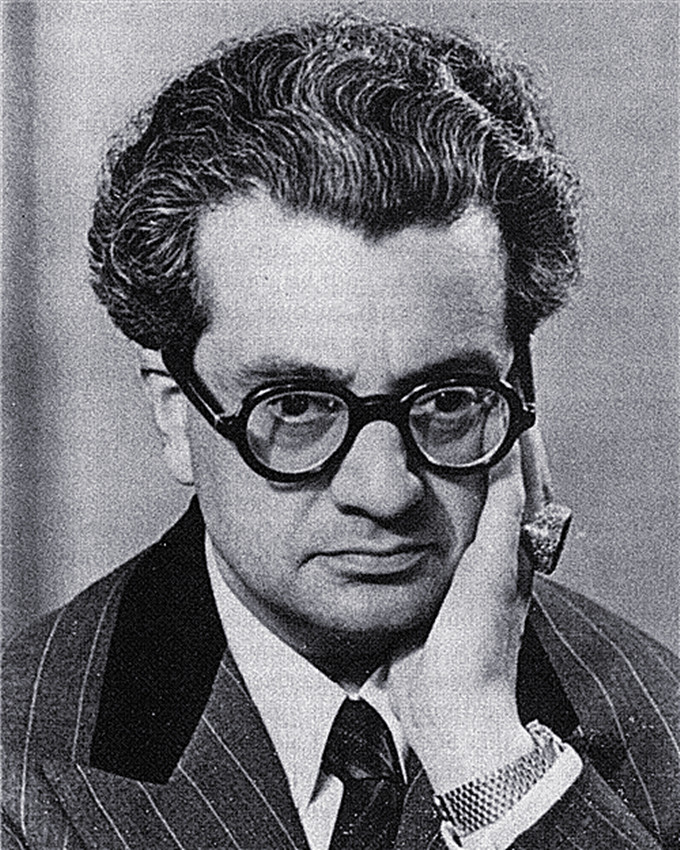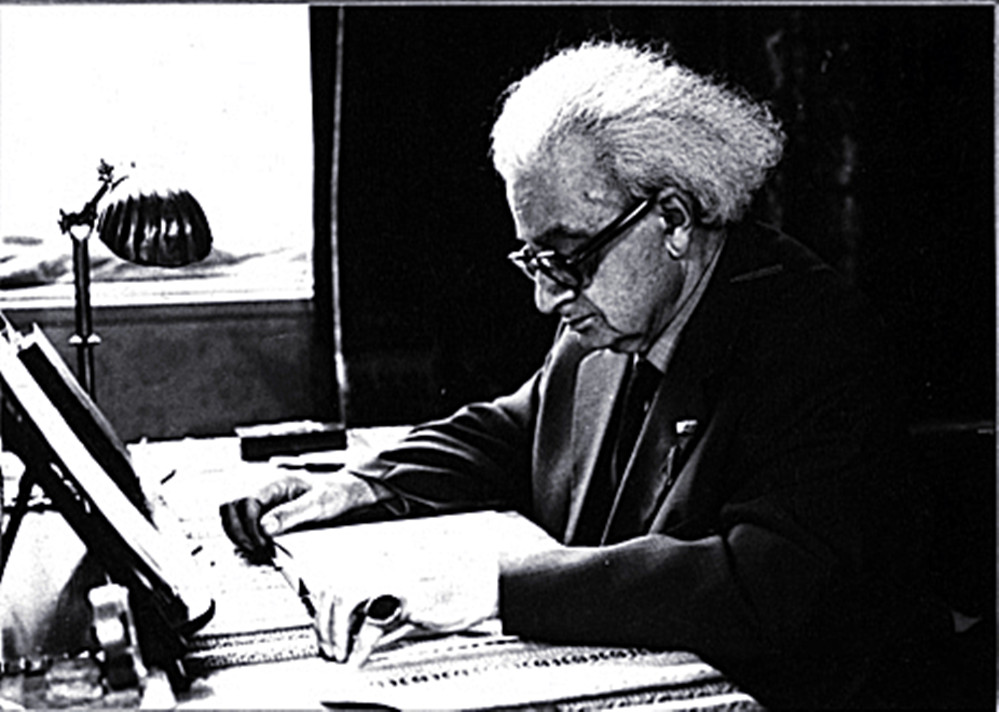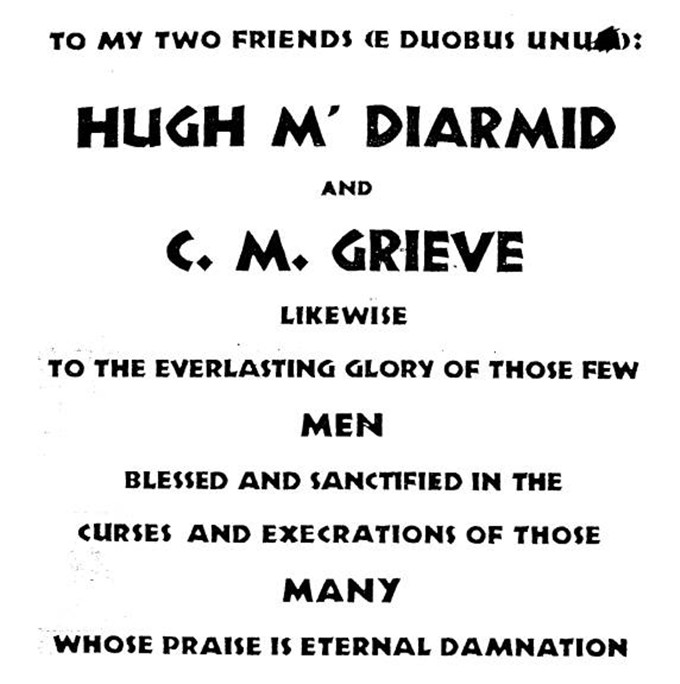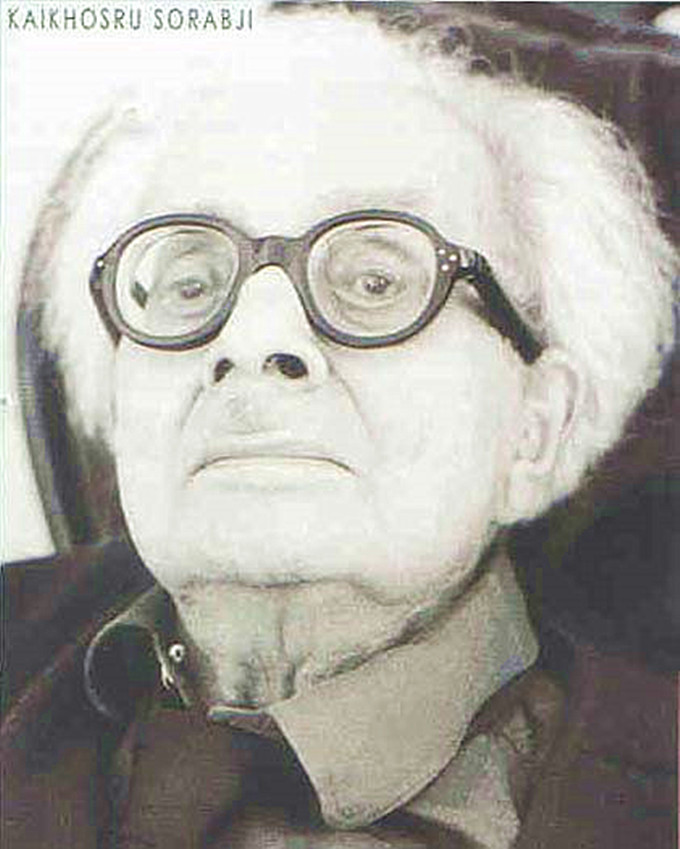| |
|
|
|
|
|
|
|
|
|
|
| |
| |
 |
|
| |
莫扎特之旅
编译
文/图 2020-08-14 19:36 |
|
| |
|
|
|
|
| |
 |
|
|
|
| |
凯克豪斯鲁.沙帕吉.索拉布吉(Kaikhosru
Shapurji Sorabji1892—1988) |
|
|
|
| |
|
|
|
|
| |
索拉布吉钢琴独奏《米开朗基罗的五首十四行诗》 |
|
|
|
| |
K.S. Sorabji -- Cinque
Sonetti di Michelangelo Buonarroti |
|
|
|
| |
米开朗基罗的五首十四行诗,用于人声和室内管弦乐队。
1980年由罗伯特·艾肯(指挥)、亨利·英格拉姆(男高音)和新的音乐会合奏(多伦多)演出)。 从无线电广播中。 1923年作
米开朗基罗的五首十四行诗,用于人声和室内管弦乐队。 1980年由罗伯特·艾肯(指挥)、亨利·英格拉姆(男高音)和新的音乐会合奏(多伦多)演出)。
从无线电广播中。 1923年作
|
|
|
|
| |
Five sonnets by Michelangelo
used in vocal and chamber orchestras.1980 by Robert Aiken (conductor),
Henry Ingram (tenor) and New Concert Ensemble (Toronto).From the
radio.In 1923 as a
Five sonnets by Michelangelo used in vocal and chamber orchestras.1980
by Robert Aiken (conductor), Henry Ingram (tenor) and New Concert
Ensemble (Toronto).From the radio.In 1923 as a |
|
|
|
| |
|
|
|
|
| |
音乐历史上的今天
1892年8月14日,钢琴家兼作曲家凯克豪斯鲁.沙帕吉.索拉布吉(Kaikhosru Shapurji
Sorabji,1892——1988)在爱萨克斯郡的清福德出生,父亲是印度帕西人,母亲是西班牙-西西里人。他从20世纪20年代起不再开音乐会,10年后停止出版作品;从1940年起禁止演出自己的作品。
凯克豪斯鲁.沙帕吉.索拉布吉(Kaikhosru Shapurji
Sorabji)英国作曲家。出生于伦敦东部的清福德,家境殷实。索拉布吉在孩童时就已经表现出在钢琴和音乐上的天赋,父母也给他安排了很好的家庭教育。成年后索拉布吉衣食无忧,1914年开始创作第一批作品。在作曲家彼得·沃洛克的引导下,索拉布吉对当代音乐产生浓厚兴趣,如布索尼(他最崇拜的作曲家)、马勒、勋伯格、雷格、戈多夫斯基的作品等。一战后,他以音乐评论家的身份,在新英国周刊和新世纪杂志发表评论。1929-1930年,他创作了自己的钢琴代表作“钢琴弹奏艺术”。他的作品篇幅往往很长,并且由于致力于作曲,演奏会因此很少举行,逐渐给观众造成孤傲之感,这很大程度上影响了大众对他作品的关注热情。他还声明,未经他的许可,不准其他人擅自公开演奏他的作品。1937年,索拉布吉决定彻底放弃所有公共音乐会的演出,尽管他也继续在一些私人演奏会上露面。1945年他离开音乐评论的工作后,主要精力完全放在作曲上。直到1976年,受钢琴家扬蒂•所罗门之邀,他才同意公开演奏他的音乐作品。紧接着约翰•奥戈东以及马克-安德鲁•哈默林也相继公开演出了他的作品,获得公众的一致好评。1988年索拉布吉在伦敦去世。索拉布吉的作品风格独特,以结合自有节奏、东方旋律和西方多声部复调创作出复杂的音乐作品而闻名。
今日视频:1、索拉布吉钢琴独奏《米开朗基罗的五首十四行诗》;2、
凯克豪斯鲁.沙帕吉.索拉布吉-《奥普什-阿奇马古姆》的“华彩乐段”。
|
|
|
|
| |
 |
|
| |
凯克豪斯鲁.沙帕吉.索拉布吉(Kaikhosru
Shapurji Sorabji) |
|
|
|
| |
凯克豪斯鲁.沙帕吉.索拉布吉 |
|
|
|
| |
(作曲家、编曲)
出生:1892年8月14日——英国埃塞克斯郡钦福德
去世:1988年10月14日——威尔汉姆,多塞特,英格兰
这位英国钢琴家、音乐作家和作曲家凯克豪斯鲁.沙帕吉.索拉布吉Kaikhosru
Shapurji Sorabji(实际上是Leon
Dudley)来自一个混血家庭。他的父亲是一名索罗亚斯德教的帕西土木工程师,而他的母亲——就目前所知——是一部分西西里人,一部分西班牙女高音。他一生中的大部分时间是在英国度过的。从他早期的青少年,他开发了一个贪得无厌的胃口的最新发展当代欧洲和俄罗斯音乐和去竭尽全力获得的最新成绩等作曲家古斯塔夫•马勒,德彪西,阿诺德·勋伯格Skryabin,谢尔盖·拉赫曼尼诺夫和其他人在一个时间,在中国,几乎所有这些音乐在很大程度上是未知的和未被承认的。在战前的英国环境下,他的教育,无论是普通的还是音乐的,大部分都是私人的,这也许并不奇怪。
作为多产的作曲家,他很快就成为,凯克豪斯鲁.沙帕吉.索拉布吉异常迟到开发者和他的贪婪吸收所有最近的趋势在别人的音乐似乎已经排除在他的脑海里他自己的想法,直到他达到二十多岁。自1913年起,索拉布吉就一直是英国作曲家菲利普·赫塞尔廷(Philip
Heseltine)的密友和知己。他曾写信给赫塞尔廷,说自己正在考虑以音乐评论家为职业。然而,一旦他开始作曲,他想象力的闸门就迸裂了,巨大的音乐创造力之河几乎不间断地奔流而出,直到20世纪80年代初。
作为一个非常注重隐私的人,他不喜欢参加任何形式的公共集会,他在极少数的场合表演了他自己的一些钢琴作品,并取得了相当大的成功,但更不情愿。20世纪30年代中期,他不仅把自己从音乐会舞台上撤了下来,还把他的作品从公众听证会上撤了下来。他宣称,他认为这些作品不适合传统的音乐会表演,而且“根本不表演比拙劣的淫秽作品要好得多”。虽然他从未像以前宣称的那样,对公开演出他的作品实施明确的“禁令”,但其结果是,近40年来,世界各地的音乐会观众几乎听不到他的音乐。考虑到表演他的大部分音乐所涉及的巨大困难,这种令人遗憾的情况将持续如此之久而不受挑战也就不足为奇了。
其间,Kaikhosru Shapurji
Sorabji担任《新时代》和《新英语周刊》的评论家,直到1945年退休;他也继续创作富有表现力和特别精致的音乐,大部分是为钢琴,丝毫不关心它是否会到达公众的耳朵。
Kaikhosru Shapurji
Sorabji很讨厌那些随意询问他和他的作品的人的打扰,因此在主要的音乐词典中,许多关于他的词条更值得注意的是它们之间的冲突,而不是他们关于他的信息的可靠性。因此,有些人记得他还活着,但对他在做什么以及为什么做的事知之甚少或一无所知,他们几乎不可避免地选择了编织关于他的神话和传说。这些图片更多地展示了它们的创造者,而不是Sorabji。他的“音乐上的霍华德·休斯”的愚昧形象是由一些无事可做的人培养出来的,要抹去这一形象花了好几年的时间。
Kaikhosru Shapurji
Sorabji在伦敦和南多塞特过着平静而朴素的生活,过着自己选择的与世隔绝的生活,没有被专业公共音乐制作的混乱扰乱。他有一笔微薄的私人收入,这使他能够过这种生活,能够不受拘束、不受干扰地干他的活。
从1976年开始,南非钢琴家Yonty
Solomon的开创性努力开始扭转Sorabji的历史声誉。在一系列的伦敦独唱会上,他第一次展示了索拉比的钢琴作品,而这些作品所产生的兴趣一直在增长和发展。他的音乐开始吸引了一小群具有杰出天赋的表演者的注意,对他们来说,即使是他的主要键盘作品中最可怕的复杂性和精湛的要求也不是不可逾越的挑战。1980年代见证了等表演,一个惊人的准确和有力的首映Sorabji两小时的器官交响曲1(1923
-
1924)和一个绝对惊人的帐户的所有four-and-three-quarter小时的钢琴作品作品clavicembalisticum(1929
- 1930),这被证明是约翰Ogdon至高无上的荣耀的职业生涯。
随着Kaikhosru Shapurji
Sorabji在96岁去世,一系列的CD唱片开始出现,包括上面提到的两个作品。Sorabji档案鼓励主要的表演者和学者从作曲家的手稿中创作出新的优秀版本。索拉布吉的百年诞辰见证了关于他的第一本完整的书的出版——《索拉布吉:一个批判的庆祝》,由保罗·拉波波特编辑。 |
|
|
|
| |
 |
|
| |
沙帕吉.索拉布吉创作的乐曲手稿 |
|
|
|
| |
Kaikhosru Shapurji
Sorabji (Composer, Arranger)
Born: August 14, 1892 - Chingford, Essex, England
Died: October 14, 1988 - Wareham, Dorset, England
The Englisg pianist, writer on music, and composer, Kaikhosru Shapurji
Sorabji (actually: Leon Dudley), came from a mixed-origin family. His
father was a Zoroastrian Parsi civil engineer and his mother - as far as
is known - was a part Sicilian, part Spanish soprano. He spent most of
his life in England. From his early 'teens he developed an insatiable
appetite for the latest developments in contemporary European and
Russian music and went to great lengths to obtain the latest scores of
such composers as Gustav Mahler, Debussy, Arnold Schoenberg, Skryabin,
Sergei Rachmaninov and others at a time and in a country where almost
all such music was largely unknown and unrecognized. Of an independent
and uniquely curious nature, it is perhaps unsurprising given the
pre-War English environment that his education, both general and
musical, was mostly private.
For a composer as prolific as he was soon to become, Kaikhosru Shapurji
Sorabji was an unusually late developer and his voracity in absorbing
all the most recent trends in other people's music seems to have
excluded from his mind the idea of making his own until he reached his
twenties. A close friend and confidant of the English composer Philip
Heseltine from 1913, Sorabji wrote to him that he was considering a
career as a music critic. Once he had begun to compose, however, the
floodgates of his imagination burst and a tremendous river of musical
creativity flowed forth almost uninterrupted until the early 1980's.
An intensely private person who loathed to participate in public
gatherings of any sort, he performed some of his own piano works on rare
occasions and with considerable success, but with even greater
reluctance. In the mid-1930's he withdrew not only himself from the
concert platform but his works from public hearings, declaring that he
considered them unsuited to conventional concert performance and that
"no performance at all is vastly preferable to an obscene travesty".
While he never actually imposed an unequivocal "ban" on public
performances of his works, as used to be claimed, the result was that
concert-goers around the world heard almost none of his music for nearly
four decades. In view of the colossal difficulties involved in
performing much of his music, it was not unexpected that this
regrettable situation would continue almost unchallenged for so long.
In the intervening years, Kaikhosru Shapurji Sorabji worked as a critic
for The New Age and The New English Weekly until his retirement in 1945;
he also continued composing richly expressive and extraordinarily
elaborate music, mostly for the piano, without the slightest care as to
whether or not it might ever reach the ears of the public.
Kaikhosru Shapurji Sorabji resented the intrusion of casual inquirers
about himself and his work, as a result of which many entries on him in
major music lexica were more notable for their conflict than for the
reliability of their information about him. As a result, some of those
who remembered his continued existence but knew little or nothing of
what he was doing and why, chose - almost inevitably, one supposes - to
spin webs of myth and legend about him. These tell more about their
creators than they do about Sorabji. It has taken some years to wipe
away the fatuous "Howard Hughes of Music" image of him which had been
fostered by some who had little better to do.
Kaikhosru Shapurji Sorabji lived quietly and modestly in London and then
in South Dorset in self-chosen isolation, undisturbed by the mêlée of
professional public music-making. He had the good fortune of a small
private income which allowed him this existence and permitted him to get
on with his work uninhibited and undisturbed.
From 1976, the pioneering efforts of South African pianist Yonty Solomon
began to turn the history of Sorabji's reputation. In a monumental
series of London recitals, he presented a number of Sorabji's piano
works for the first time and the interest which these generated has
grown and developed ever since. His music began to attract the attention
of a small but distinguished group of performers of outstanding gifts
for whom not even the most fearsome complexities and virtuosic
requirements of his major keyboard works presented insurmountable
challenges. The 1980s witnessed, among other performances, an
astonishingly accurate and powerful premiere of Sorabji's two-hour Organ
Symphony No. 1 (1923-1924) and an absolutely stunning account of all
four-and-three-quarter hours of his piano work Opus clavicembalisticum
(1929-1930), which proved to be the crowning glory of John Ogdon's
career.
Following Kaikhosru Shapurji Sorabji's death at the age of 96, a series
of CD recordings began to appear, including the two works mentioned
above. The Sorabji Archive has encouraged major performers and scholars
to create fine new editions of the composer's works from his
manuscripts. Sorabji's centenary year saw the publication of the first
full-length book on him - Sorabji: A Critical Celebration, edited by
Paul Rapoport. |
|
|
|
| |
|
|
|
|
| |
史上最长的古典乐作品,听众的内心是绝望的
|
|
|
|
| |
英籍波斯裔作曲家凯霍斯鲁·索拉布吉(1892-1988)是
20
世纪最多产的钢琴作曲家之一,但几乎没有钢琴家把他的作品纳入演奏曲目,因为他的曲子虽然听起来正常——有旋律、有节奏、有织体、有方向、甚至有主题和发展,也不是“复杂派”作曲家布莱恩·费尼霍夫(Brian
Ferneyhough)那样满篇都是没法演奏的东西——它是既难,又长。
难的比如《100首超级技巧练习曲》,沿袭肖邦、李斯特的音乐会练习曲传统,但其节奏和织体的复杂令人望而生畏,迄今尚未有完整的录音。(钢琴家
Fredrik Ullén 已在 BIS 录制了前 71 首,共 4 CD。)
长的就太多了,所以也不必列出具体哪部。比如 100 首练习曲的第 100 首——一首五个主题的赋格,就长达 40 分钟。练习曲哎!
索拉布吉离群索居。所以,虽然活在 20
世纪,他的生平充满未解之谜。正如他自己所说:“关于我出生的日期和地点,各种辞书无一例外地写错了。”但他就是不告诉你。
所以我们还是来看看他写过什么吧。
随意翻阅索拉布吉档案网站(sorabji-archive.co.uk),就可以看到好多时长在三位数分钟的作品。比如《第五钢琴奏鸣曲“大魔法”》(Piano
Sonata No. 5 “Opus Archimagicum”),估计时长 330 分钟,《钢琴作品》(Opus
Clavicembalisticum)长 285 分钟,《第一钢琴交响曲“密宗”》(Piano Symphony No. 1
Tantrik)270 分钟,《第五钢琴交响曲“短交响曲”》(Piano Symphony No. 5 Symphonia Brevis)140
分钟(“短”?)……
上述几部仅有《钢琴作品》有人演,我尚未听过全曲,只能先拿 123 分钟长的《第四钢琴奏鸣曲》过过瘾。
Opus Clavicembalisticum 第一部分的引子
索拉布吉的乐队作品也十分庞大,关于十五世纪波斯诗人、神秘主义者贾米(Nur ad-DīnAbd ar-Rahmān
Jāmī)的《“贾米”交响曲》动用 6 管乐队、7 声部合唱,长达 280 分钟。当然也没有人演过。
也许他对音乐、对艺术抱有一种中世纪式的信念,爱用拉丁语,也仿佛要动用一切可能的力量来称颂什么。这只是我的猜测。他著述颇多,但我尚未读到。不过,在能够找到的诸多语录式文字中,能够看出索拉布吉并不太好相处。 |
|
|
|
| |
 |
|
|
|
| |
例如《钢琴作品》的封面上,他注明:“未经作曲家许可,禁止演奏本作品。”题献更是写得仿佛要反社会:
上面这句比较拗口,不太好翻译,大意就是“致我的两个朋友,也致那极少数人,你们的荣耀是在多数人的诅咒中受到祝福和认可的,那些傻逼的颂扬就是永恒的劫难”。
他自己有一句简单些的:
“致那些可能有关的人——如果有的话——以及其他除了自己的事情以外任何人的事情都要管的人。”
(To those whom it may concern, if any, and others who mind anybody’s
business but their own.)
倒是很优雅的英语呢。 |
|
|
|
| |
 |
|
|
|
| |
沙帕吉.索拉布吉(Kaikhosru Shapurji
Sorabji)不好相处的面相 |
|
|
|
| |
埃里克·奇索姆博士访谈 |
|
|
|
| |
今天早晨,我将与您谈谈一个非常陌生的人,无论您将他视为男人还是音乐家。他的名字在出生证明上是Dudley
Sorabji,但后来改名为Kaikhosru Shapurji
Sorabji,并以此名字出版了15首作品和两本音乐论文集,并为《英语周刊》和《新时代》撰写了音乐评论。我不知道在阳光下的每个主题上,已经向《伦敦时报》,《天主教先驱报》,《广播时报》等报纸发送过数百封致编辑的信。
他的手稿作品远远超过已出版的作品:他写了长而复杂的作品,如果进行了表演,将占据整个晚上的节目,持续时间为两到三个小时,当我1962年最后一次见到他时,他向我展示了他的最新手稿-长度一小段:事实-Sorabji是极端生物。自1917年以来,Sorabji从未停止创作,但一直坚决拒绝让任何人演奏他的音乐,甚至拒绝了约翰·奥格登(John
Ogdon)钢琴家最近的要求,约翰·奥格登已经在Sorabji的一项重要作品上工作了数年。 -他的Opus
Clavicembalisticum-并希望执行它。索拉布吉本人是一位钢琴演奏家,技术精湛,他一生中可能只有八次表演(他现在70年代初)表演了自己的音乐,其中三场是在我们的活跃社团音乐会上进行的。
他出生于1892年的伦敦,一生都住在那里或多塞特郡的科菲城堡。他的父亲(Parsi)是孟买的一位富有的工程师。他的母亲是西班牙人,并且曾经是歌剧歌手-这是一次最不寻常的婚姻,导致了一个不寻常的儿子的出生。
可能最快捷地让您了解Sorabji角色的方法是阅读他最近给编辑的几封信。他们揭示出他是一个对所有可能想到的话题拥有最强见解的人,用一系列的敲除,大锤打击无畏地,无畏地刺鼻地表达了这些见解,承认存在或没有其他观点:没有矛盾,没有妥协,不可能对他提出任何论点。每个人都是傻瓜,除了他自己,还有几个-几个-精英,自然是他的朋友们。索拉布吉认为他是对的-永远是对的-绝对是对的-绝大多数人是无可救药的错误-或者是愚蠢的人,或者是彻头彻尾的骗子。历史已经抛弃了具有无所不能的类似天才的多个天才-理查德·瓦格纳(Richard
Wagner),乔治·伯纳德·肖(George Bernard Shaw)则是另一种,而这些强硬的人物常常是对的!
|
|
|
|
| |
Interview with
Dr. Eric Chisholm |
|
|
|
| |
This morning I am
going to talk to you about a very strange person, whether you regard him
as a man or as a musician. His name, on his birth certificate, is Dudley
Sorabji, but he changed it to Kaikhosru Shapurji Sorabji, and under that
name has published 15 compositions and two books of musical essays, has
written musical criticisms for the English Weekly and the New Age, and
has sent, I don't know how many, hundreds of letters-to-the-editors to
newspapers like the London Times, Catholic Herald, Radio Times, etc. on
every subject under the sun.
His manuscript works far outnumber the published ones: he has written
long and complex works which would occupy an entire evening's programme,
if they were ever performed, that is of two to three hours duration and
when I saw him last in 1962, he showed me his latest manuscript - pieces
one bar in length: ipso facto - Sorabji is a creature of extremes. Since
1917, Sorabji has never ceased to compose, yet has steadfastly refused
to allow any one to play his music and even turned down a recent request
from a pianist of the order of John Ogdon, who had worked for several
years on a major Sorabji work - his Opus Clavicembalisticum - and wished
to perform it. Sorabji is himself a pianist with a formidable technique
who perhaps only eight times in his life (he is now in his early 70's)
has given performances of his own music and three of these were at our
Active Society concerts.
He was born in London, 1892, and has lived there or at Corfé Castle,
Dorset all his life. His father (a Parsi) was a wealthy engineer in
Bombay; his mother Spanish and a one time opera-singer - a most unusual
marriage resulting in the birth of a most unusual son.
Probably the quickest way to give you an insight into the character of
Sorabji is to read you a few of his recent letters to editors. They
reveal him as a person holding the strongest possible opinions on every
conceivable subject, expressing these opinions pungently, fearlessly,
with biting wit, in a series of knock-out, sledge-hammer blows which
admit the existence or no other point of view: no contradiction, no
compromise, no possible argument can be held against his. Everyone is a
fool, except himself, and a few - a very few - of the elite, naturally
enough his friends. Sorabji believes that he is right - always right -
absolutely right - that the huge majority of people are hopelessly wrong
- or altenatively fools, or down-right crooks. History has tossed up
more than a few geniuses with similar omnipotent beliefs - Richard
Wagner, for one, George Bernard Shaw for another, and quite often these
strong-headed characters have been right! |
|
|
|
| |
|
|
|
|
| |
Today in the
history of music
On August 14, 1892, pianist and composer Kaikhosru Shapurji Sorabji
(1892 -- 1988) was born in Chingford, Essex, the son of an Indian Parsi
father and a Spanish-Sicilian mother.He stopped giving concerts in the
1920s and stopped publishing a decade later;The performance of one's own
work has been banned since 1940.
Kaikhosru Shapurji Sorabji, British composer.Born in Qingford, East
London, he came from a wealthy family.Sohrab had shown a talent for
piano and music as a child, and his parents provided him with a good
home education.As an adult, Sohrab was well fed and began writing his
first works in 1914.Under the guidance of composer Peter Warlock, Sohrab
developed a strong interest in contemporary music, such as the works of
Busoni (the composer he most admired), Mahler, Schoenberg, Reg,
Godovsky, etc.After the First World War, he commented as a music critic
in The New British Weekly and the New Century magazine.In 1929-1930, he
created his masterpiece "The Art of Piano Playing".His compositions tend
to be long, and because of his dedication to composing, concerts are
rarely held, gradually creating a sense of isolation for the audience,
which has greatly influenced the public's enthusiasm for his works.He
also stated that no one would be allowed to perform his work publicly
without his permission.In 1937, Sohrab decided to give up all public
concerts altogether, although he continued to make appearances at
private concerts.After he left music criticism in 1945, he concentrated
entirely on composing music.It was only in 1976, at the invitation of
pianist Yanti Solomon, that he agreed to perform his music publicly.It
was followed by performances by John Ogodon and Mark-Andrew Hammerling,
which were well received by the public.Sohrab died in London in
1988.Sohrab's unique style of music is known for its complex
compositions combining its own rhythms, Eastern melodies and western
polyphony.
1. The Five Sonnets of Michelangelo by Sohrab Solo Piano;2. "Cadeau" of
Kekhauslu Shapaji Sohrabuji in Oppus-Achimakum. |
|
|
|
| |
|
|
| |
|
|
|
|
| |
凯克豪斯鲁.沙帕吉.索拉布吉-《奥普什-阿奇马古姆》的“华彩乐段” |
|
|
|
| |
ThKaikhosrShapurji Sorabji – 'Cadenza' from Opus
Archimagicum
|
|
|
|
| |
|
|
|
|
| |
未得原作者编者授权严禁转载www.mt77.com任何内容 |
|
|
|
|
|
|
|
|
|
|
|
|
|
|


